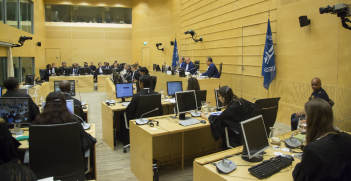The Six Day War at 50

Israeli Prime Minister Levi Eshkol recognised the contradiction between Israel’s desire to be a Jewish state and the occupation of Palestinian territories 50 years ago. Yet, even now, the consequences of the 1967 Six Day War remain unresolved.
Israel’s pre-emptive strike against three hostile Arab neighbours in early June 1967 changed the political landscape of the Middle East faster and more fundamentally than any other war in modern history. That was the verdict of a recent assessment in the respected Washington journal National Interest. The war “established the Jewish state as a regional great power and … provided Israel with strategic depth”. But it would also so burden the country’s international relations that 50 years later it finds itself on a seemingly permanent war footing.
On 4 June 1967, the government of Levi Eshkol authorised a surprise pre-emptive attack against Egypt. Within 24 hours, most of the Egyptian and Jordanian air force had been destroyed (some 400 planes) and Israel’s army had swept across the Sinai Peninsula within reach of the Suez Canal. By 7 June, the old city of Jerusalem had been captured, and the following day Egyptian forces were defeated.
The focus then switched to Syria’s Golan Heights, where Syrian forces had initiated an assault on the strength of a false claim (apparently planted by the Soviet Union) that Israel had amassed an army along the Syrian frontier. There had been some reluctance on the part of Israeli defence chiefs and the defence minister, Moshe Dayan, to provoke Syria, but the decision to strike was taken by Dayan against the wishes of cabinet.
Israel initially refused to acknowledge that attacks on Egypt, Jordan and Syria had been pre-emptive, but within weeks the government revised its official stance. There is no doubt that President Nasser of Egypt had been acting provocatively, threatening to close the Strait of Tirana to Israeli shipping and demanding a withdrawal of the UN Emergency Force stationed in the Sinai, and he enlisted the support of Jordan’s King Hussein for a joint engagement with Israel. There had been no progress towards recognition by the neighbouring Arab states of the Israeli state, which had declared independence in May 1948.
Jordan’s situation was rather different. The Israelis had never felt as threatened by Jordan as by Egypt and Syria; once hostilities began, Eshkol’s government sought quickly to neutralise Jordan with an attractive peace offer. King Hussein responded that the offer had arrived too late and that he was committed to a military pact with Nasser. The consequence of this negative response was that Jordan would lose control of East Jerusalem and the West Bank to Israel.
The attitude of the United States was a key factor in the Israeli government’s decision to undertake a pre-emptive strike. US President Lyndon Johnson’s administration had initially cautioned Eshkol against invasion, but a secret mission to Washington DC by the Mossad Director-General, Meir Amit, in late May 1967 elicited a rather different response. The US was now eager to see Nasser’s regional influence reduced, even against the risk of Egypt moving into the Soviet orbit.
Historians of the war agree that the speed and decisiveness of Israel’s victory left the government in a state of some confusion as to how to handle the spoils. There was no master plan for administration of the West Bank: indeed, its capture was left until very late in the conflict, following the retreat of Jordanian forces across the river.
“How do we control a million Arabs?”, Yitzhak Rabin, Eshkol’s senior military advisor, was heard to ask (in fact there were 1.25 million). For Israelis, the most treasured prize was Jerusalem’s old city, but neither cabinet nor the Israeli general staff had proposed its capture until Jordanian bombardment began. It was fortunate that Uzi Narkis, the Israeli military commander at the capture of the Western Wall and Temple Mount, rejected the repeated appeals of the Israeli Defence Force’s chief rabbi, Shlomo Goren, to blow up the Dome of the Rock in the moment of victory.
Palestinians played little part in the Six Day War and their plight and political status do not appear to have been a major concern of either the Israeli or Arab governments in the immediate aftermath of the war. On 18 June, just 11 days after its capture, East Jerusalem was annexed by Israel. In late August, an Arab summit held in Khartoum reaffirmed that that there would be no recognition of Israel, no political negotiations and no offer of peace. In November, the UN Security Council passed Resolution 242, calling for an Israeli withdrawal from the captured territories and steps toward creating a Palestinian state within pre-1967 frontiers. That seemingly doomed resolution remains a key point of reference in UN Security Council debates.
Nevertheless, in the late 1960s both Nasser and Hussein warmed to the idea of a peaceful settlement with Israel, and Jordan was fortunate that the next prime minister of Israel, Golda Meir, developed a respect and even fondness for King Hussein. Yet Meir was quite unmoved by the plight of Palestinian Arabs and denied the legitimacy of their claim to be a national people.
Israel suffered an unexpected reversal of fortune in October 1973 on Yom Kippur, Israel’s holiest day, when Egypt and Syria launched their own pre-emptive strike, which was not repulsed until late October. Both sides sustained heavy casualties and the Israeli public was outraged by the government’s lack of preparedness.
The peace that followed remained uneasy. The regional security environment meanwhile was changing profoundly: the US saw Israel as a bastion of regional order in the Middle East and deserving of more generous military aid; the Palestine Liberation Organisation had made its appearance as the key, oft-times violent, proponent of a Palestinian state; and more strident Zionist voices within Israel began calling for Israel’s borders to encompass the whole of biblical Palestine and encouraging new settlements within the West Bank. Moreover, Israel was making progress toward the acquisition of its own nuclear deterrent.
Half a century after the Six Day War, the consequences of that conflict continue to be painful. Successive Israeli governments have tried to justify their continued occupation of territories seized in June 1967, and no progress has been made towards the establishment of a sovereign Palestinian state. Indeed, even though the harsh Hamas regime in the Gaza strip recently signalled a willingness to recognise Israel’s right to exist if pre-1967 borders were upheld, there has been no serious follow-up. Prime Minister Eshkol warned his successor, the intransigent Golda Meir, that Israel could not expect to keep its territorial “dowry” without also keeping the “bride”: the Palestinian Arabs who live there. But no Israeli government has shown any willingness to relinquish the dowry.
Peter Boyce AO is an adjunct professor with the University of Tasmania’s Politics and International Relations Program and president of AIIA Tasmania Branch.
This article is published under a Creative Commons Licence and may be republished with attribution.





